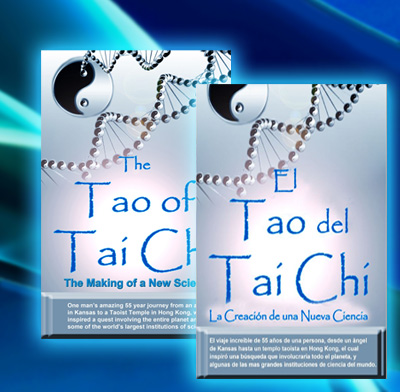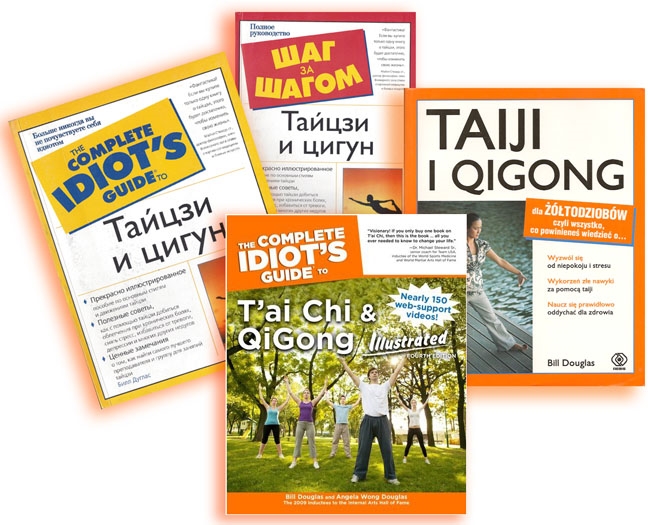elderly and Tai Chi, qigong medical research
SCROLL DOWN FOR YOGA, MEDITATION, MINDFULNESS
Also see "geriatrics"
Evidence Map of
Tai Chi (OLDER ADULTS)
SUMMARY
Tai Chi has been
investigated as a treatment for a number of clinical
indications and outcomes. The systematic review of
systematic reviews identified 107 Tai Chi systematic reviews.
Reviews addressing general health effects, psychological
wellbeing, or interventions in older adults included between
31 and 51 Tai Chi RCTs. The topic areas balance, hypertension,
falls, quality of life, cognitive performance, and
vestibulopathy have also been the focus of research; included
reviews identified 10 or more pertinent RCTs per topic.
Statistically significant effects pooled across existing
studies were reported for hypertension, falls outside of
institutions, cognitive performance, osteoarthritis, COPD,
pain, balance confidence, depression, and muscle strength.
READ ENTIRE STUDY AT
VETERANS ADMINISTRATION HOSPITAL, LOS ANGELES
Effectiveness of Tai Chi for Health Promotion of Older
Adults: A Scoping Review of Meta-Analyses (Western University,
Canada)
Discussion
Twenty-seven meta-analyses were synthesized in this scoping
review with the aim of summarizing the current knowledge of
the effectiveness of Tai Chi on health promotion of older
adults. “High” and “moderate” quality evidence indicates that
practicing Tai Chi can lead to significant improvements in
balance, cardiorespiratory fitness (forced vital capacity and
peak oxygen uptake), cognition (global cognition and executive
function), mobility, proprioception, sleep and strength, as
well as significant reductions in the incidence of falls and
nonfatal stroke and reduction in stroke risk factors.
Additional preliminary evidence from heterogeneous findings
includes potential benefits for adults on the following
outcomes: body composition, bone mineral density,
cardiorespiratory fitness (diastolic and systolic blood
pressure, heart rate, and stair test), cardiovascular disease
risk factors, cognition (memory function), physical function,
and psychological health (anxiety, depression, and stress).
One of the meta-analyses included in this scoping review noted
that heart rate was significantly higher immediately after
practicing Tai Chi, compared to a nonintervention group,40
supporting the belief that Tai Chi offers some level of
aerobic training.
READ ENTIRE STUDY AT
SAGE JOURNALS: AMERICAN JOURNAL OF LIFESTYLE MEDICINE
Qigong among older adults: a global review
Conclusion
In conclusion, the
existing body of research regarding Qigong and older adults
indicate that Qigong may be an effective way of improving
health outcomes, including overall quality of life,
psychological distress, and pain.
READ ENTIRE STUDY AT
O.A.T. OPEN ACCESS TEXT
A Comprehensive Review of Health Benefits of Qigong and
Tai Chi
Results
Seventy-seven
articles met the inclusion criteria. The 9 outcome category
groupings that emerged were: bone density (n=4),
cardiopulmonary effects (n=19), physical function (n=16),
falls and related risk factors (n=23), Quality of Life (n=17),
self-efficacy (n=8), patient reported outcomes (n=13),
psychological symptoms (n=27), and immune function (n=6).
Conclusions
Research has demonstrated consistent,
significant results for a number of health benefits in RCTs,
evidencing progress toward recognizing the similarity and
equivalence of Qigong and Tai Chi.
VISIT
NATIONAL LIBRARY OF MEDICINE for details
A Review of Clinical Trials of Tai Chi and Qigong in Older
Adults
Conclusion
SEE BENEFITS
OF TAI CHI & QIGONG FOR THE ELDERLY, BROKEN DOWN BY
CATAGORIES:
* Balance and Falls
*
Physical Function
* Cardiovascular
Health
* Psychological Outcomes
* Disease Outcomes
Following this review of the current
literature on TC&QG in the older adult population, it appears
that participants are impacted from multiple perspectives.
VISIT
NATIONAL LIBRARY OF MEDICINE to see
results
Subjective Experiences of Older Adults
Practicing Taiji and Qigong
Discussion
We found that although each interviewee had his or her own
unique experience of Taiji and Qigong there were strong
commonalities among the eight respondents. All began with
motivations related to physical problems and concerns, and,
all reported significant functional improvement. All also
reported experiencing benefits in at least three other
dimensions, and all reported integrated mind-body experiences
that were, in their own subjective assessments, powerful and
unexpected. Ultimately, all of the interviewees felt that
these complex integrative experiences were the most important
and meaningful outcome of their participation in Taiji. And so
as they practiced Taiji and experienced more complex benefits,
their motivations to continue shifted accordingly.
VISIT
HINDAWI JOURNAL OF AGING for details of
study
FIND MUCH MORE RESEARCH AT THE
"QIGONG INSTITUTE DATABASE"
Since 1984, collecting
breaking medical/science research on Qigong, Tai Chi, Yoga,
and Mind-Body Education
Click here
for Qigong Institute Database...
YOGA
Yoga for Healthy Aging: Science or Hype?
While everyone should consult their physician before starting
a physical regimen, yoga appears to have a wide range of
benefits including increased mobility; reduced risk for slip
and fall; protection against cognitive decline; increased
flexibility, strength, and balance; and improved sleep and
mental well-being.
Gupta et al. found that yoga had
both immediate and long-term impacts on State and Trait
anxiety score [32]. Gururaja and colleagues showed that
seniors age 65 to 75 years who participated in 90 minutes of
yoga classes once or twice weekly for a month, had significant
reductions in state and trait anxiety scores [33].
VISIT
NATIONAL LIBRARY OF MEDICINE for details of study
MINDFULNESS / MEDITATION
A
qualitative study of older adults’ perspectives on initiating
exercise and mindfulness practice
Results
Older adults indicated
that the mindfulness training increased their awareness and
self-reflection and fostered a more self-accepting attitude.
Furthermore, they improved their self-care habits and reported
having better familial and social relationships.
View details of study by visiting
BMC GERIATRICS
Benefits of mindful meditation for
older adults—and how to get started
Does meditation help
elderly?
Mindful meditation has many potential
physical and psychological benefits for older adults,
including better focus, enhanced calmness, less stress, and
improved sleep. Research shows that mindfulness and meditation
can reduce depression and pain, and boost emotional
well-being.
View details of study by visiting
SENIORS MATTER
* NOTE: World Tai Chi & Qigong Day advises
consulting your physician before beginning any new exercise,
herbal, diet, or health program. The research listed here is
meant to stimulate a discussion between you and your
physician, health insurance carrier, etc., not as medical
advise. Research and comments provided here are hoped to
stimulate a more robust discussion of powerful natural
mind/body health tools. Popular media, health media, and
government must increase attention to stunning emerging
research, including the UCLA study indicating Tai Chi
participants enjoyed a 50% increase in immune system
resistance to viral infection.
- To learn more about tai chi & qigong medical research,
see the below book,
"the complete idiot's guide to tai chi & qigong,", and also
"Harvard Medical School Guide to Tai Chi," and
"The way of qigong: the art and science of chinese energy healing."
Click to purchase this acclaimed best-selling Tai Chi book, with nearly 150 web-video support videos for the detailed text/illustration instruction as a "gift of health" for loved ones.
A new paradigm in multi-media educational books.
"Visionary! If you only buy one book on T'ai Chi, then this
is the book. This book is all you ever needed to know to
change your life. I have taught T'ai Chi for several decades
myself, yet I have now read Bill's book from cover to cover
seven times, and still get something new from it each time."
– Dr. Michael Steward Sr., D.MA, Ph.D., MA, Senior
Coach for Team USA, Inductee of the World Sports Medicine and
World Martial Arts Hall of Fame
"Sometimes Chinese
culture can be difficult to explain. Sifu Bill Douglas
successfully uses American culture to explain the art of T'ai
Chi Chuan. He simplifies difficult concepts, making them
easier to understand. This book takes the best parts of T'ai
Chi and makes them understandable [to Westerners] without
requiring a grounding in Chinese culture and history."
– Sifu Yijiao Hong, USA All-Tai Chi Grand Champion and USA
Team member; Certified International Coach and Judge,
International Wushu Federation
"Douglas has
achieved for QiGong what Apple did for the computer. He's
brought it to the people … great place to start for beginners.
… Teachers may also find this an excellent manual 'on how to
explain these concepts to the general public…'"
– R.
Poccia,
"The Tao of Tai Chi: The Making of a New Science" (now available in both English and Spanish))

Harvard Medical School Researchers Launch Tai Chi as Therapy Lecture to Commemorate World Tai Chi Day
The new Harvard Medical School Guide to Tai Chi is a powerful
reference book for all tai chi and qigong advocates, teachers,
etc. The Harvard Guide cites WorldTaiChiDay.org's work in
expanding global awareness of tai chi and qigong!
Our
efforts have exposed over ONE BILLION potential viewers/readers
of mass media to Tai Chi and Qigong and its myriad health
benefits, via our annual WTCQD worldwide events.
